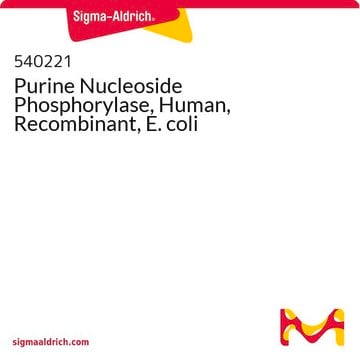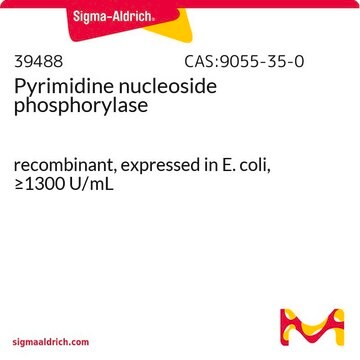40809
Purine nucleoside phosphorylase
recombinant, expressed in E. coli, ≥120 U/mL
About This Item
Produits recommandés
Produit recombinant
expressed in E. coli
Forme
buffered aqueous solution (100 mM phosphate buffer with 1 mM MgCl2)
Activité spécifique
≥120 U/mL
Température de stockage
−20°C
InChI
1S/C10H12N4O4/c15-2-6-7(16)8(17)10(18-6)14-4-13-5-1-11-3-12-9(5)14/h1,3-4,6-8,10,15-17H,2H2/t6-,7-,8-,10-/m1/s1
Clé InChI
MRWXACSTFXYYMV-FDDDBJFASA-N
Vous recherchez des produits similaires ? Visite Guide de comparaison des produits
Application
Actions biochimiques/physiologiques
Définition de l'unité
Code de la classe de stockage
12 - Non Combustible Liquids
Classe de danger pour l'eau (WGK)
WGK 3
Point d'éclair (°F)
Not applicable
Point d'éclair (°C)
Not applicable
Certificats d'analyse (COA)
Recherchez un Certificats d'analyse (COA) en saisissant le numéro de lot du produit. Les numéros de lot figurent sur l'étiquette du produit après les mots "Lot" ou "Batch".
Déjà en possession de ce produit ?
Retrouvez la documentation relative aux produits que vous avez récemment achetés dans la Bibliothèque de documents.
Notre équipe de scientifiques dispose d'une expérience dans tous les secteurs de la recherche, notamment en sciences de la vie, science des matériaux, synthèse chimique, chromatographie, analyse et dans de nombreux autres domaines..
Contacter notre Service technique








